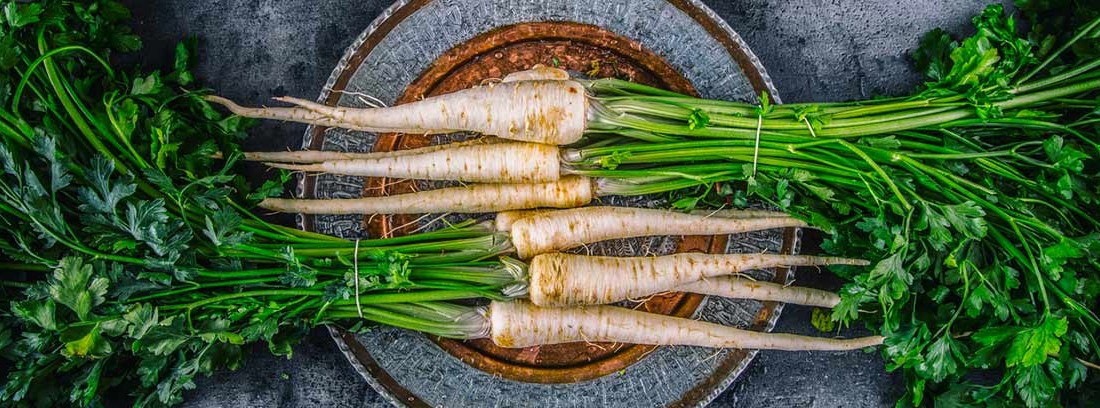Benefits of parsnip for our health

Parsnip or is a root vegetable belonging to the Umbelliferae family, similar to carrots, celery or fennel, whose flesh is fleshy and thick. It is usually consumed in the autumn and winter months.
It is native to Asia and Europe and was considered a basic food in gastronomy before the potato arrived. Despite the fact that its consumption is not very widespread at present, it is a very versatile vegetable that we can use as an ingredient in many dishes (broths, soups, meat or fish stews ...)
To avoid heart disease
Due to its content of fiber and essential fatty acids, it helps to improve the lipid profile, blood pressure and in general prevent cardiovascular diseases.
Antioxidant function
Thanks mainly to the vitamin C contained in parsnip, it protects cells from damage caused by free radicals, which contribute to the development of certain diseases and play a role in aging processes.
During pregnancy
Its folic acid content makes it a very suitable food for pregnant women, as it helps prevent, among other things, spina bifida.
Prevent constipation
Both soluble and insoluble fiber present in parsnip helps prevent and improve constipation.
weight loss or control
Thanks to its fiber content that give it satiating characteristics and its low caloric content (61.36Kcal / 100 grams of food), it is an ideal vegetable in weight loss diets.
6 Nutrients that stand out from parsnip
The parsnip stands out for its content of complex carbohydrates, fiber and essential fatty acids omega 3 and omega 6, vitamins of group B, C and E and minerals.
Fiber
Parsnip contributes so much soluble fiber (pectin) as insoluble (lignin). Insoluble fiber adds bulk to the stool and helps food pass through the digestive tract faster. Soluble fiber is one that captures water, forming a bulky gel-like substance that aids in digestion, softens and helps eliminate stool.
Folates
Another of the vitamins that we find in not negligible quantity in parsnip are folates, also called, which intervenes in the production of red blood cells, in the development of the nervous system, participates in the synthesis of genetic material and in the formation of antibodies . In addition, it is very important when it comes to preventing anemia and spina bifida
Essential fatty acids
Essential fatty acids (EFAs) are vital nutritional components since they are necessary to carry out innumerable functions such as, for example, reduce the accumulation of lipids in the arteries, promote the synthesis of hemoglobin, intervene in the synthesis of cholesterol, are components of cell membranes, etc. As the name suggests, they are essential nutrients, because our body cannot synthesize them, so they must necessarily be provided through the diet, as with parsnip.
Vitamin C
Vitamin C is a antioxidant It helps to combat those that are produced in the body for different reasons, harmful to the body. In addition, it is necessary for the growth and repair of tissues, forming proteins that make up the skin, tendons, ligaments ... It helps in the wound healing and participates in the absorption of iron.
Magnesium
Parsnip contains remarkable amounts of this mineral. It is responsible, among other functions, for maintaining proper functioning of the intestines, muscles and nerves, it also participates in the regulation of cardiac contraction, improves the immune system, and also is part of bones and teeth
Potassium
Parsnip stands out for its potassium content. This mineral is typical of vegetables, essential for the transmission and generation of the nerve impulse, participates in muscle contraction, as well as in the water balance both inside and outside the cell. One of the consequences of electrolyte loss due to dehydration can be cramps.
Purchase, conservation and consumption
For choose well a parsnipWe must make sure that they have a consistent meat and a thin skin, without bumps or marks. When we take it we should not be able to bend it, because if so, the parsnip is past.We can keep it in the fridge and consume it within a week so that it does not lose its properties. It can be kept in the freezer, but it must be “blanched” before, that is to say “semi-cook”. We will boil them in water with a pinch of salt for 5 minutes if we want to keep the whole piece, or three minutes if we freeze it in pieces.
Remember that…
- Parsnip contains folates, also called folic acid or vitamin B9, which is involved in the production of red blood cells, in the development of the nervous system, participates in the synthesis of genetic material and in the formation of antibodies.
- Due to its nutritional properties the World Health Organization (WHO) recommends its consumption on a regular basis.
Diploma in Human Nutrition and Dietetics
Master in Pediatric Nutrition and Sports Nutrition
(Updated at Apr 14 / 2024)